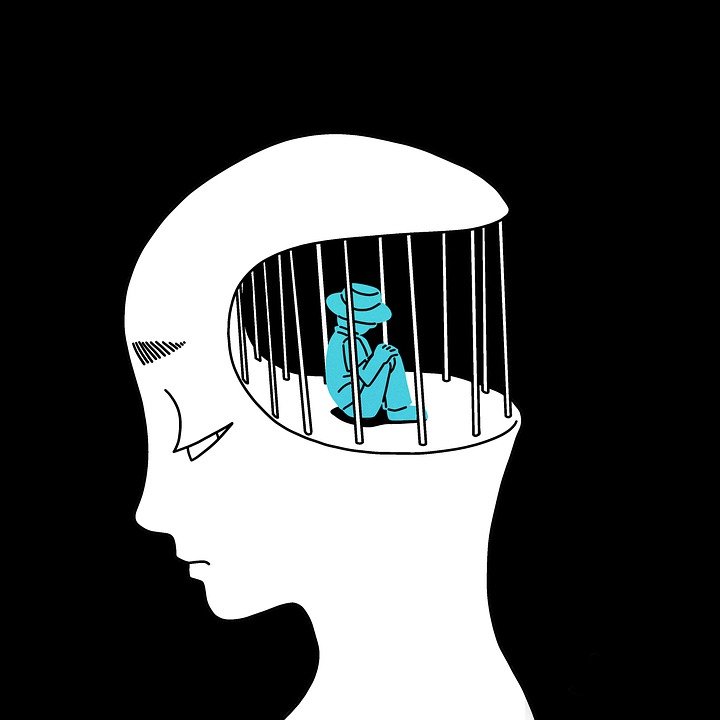Can "I" break free?

The year is 2105. Capitalism has achieved yet another feat. MetaMorphMind (MMM), Inc is a new company that promises to solve the problem known as death. Their solution? They will scan your brain as soon as you die, 3D print an artificial electronic brain and connect it to the cyber pseudo-reality of the metaverse. You will live as long as there is electricity on the planet to keep the servers running. Your loved ones (both living and dead) would be able to talk to you whenever they want. Sounds great, doesn't it? But the question is would you be able to talk to them? Will that electronic version be your "self" that is talking to them?
Who is the "I"?
This gets us back to a centuries-old philosophical question - who is the "I"? Technically, the "I" is merely a character in your mind. It is the lead character of the movie running in your head. The "I' helps you ponder through your memories and imagine your future actions in the first person. It is a manifestation of trillions of connections between the individual brain cells - your connectome - shaped by your development and experiences. The fun part is, that there is more than one 'I' that lives in your brain. In one of the classical examples of neuroscience, VS Ramachandran observed that if you split the two brain hemispheres (right and left), you may get two personalities sharing one body. For instance, if one brain hemisphere believes in God, the other can be an atheist. Dr Jill Bolte thinks that each hemisphere of the brain can be further divided into thinking and emotional characters. It is hard to say how many personalities can we divide a single person into, but when everything is connected in the brain, we perceive it as a single "I". But is this "I" separable? What I mean is can you take it out of your mind and body and place it somewhere else? One thing is clear though, you can't leave any part behind. You have to take all those characters together as one.
Can we transplant the brain?
So why not just take the entire brain out of someone who is dying due to some terminal disease in the body and place it into a healthy body? Or if you want to make it sound better, why can't you just take the head and attach a new body to it? Some people think that this will be like an organ transplant but all organs at once. Now, some surgeons and researchers have tried transplanting the heads of the animals onto new bodies. Many have reported successful head transplant surgeries since the 1970s in rodents and monkeys, but there is a limitation. While these surgeries were able to connect the blood supply from the new body to the transplanted head, the transplanted head was unable to use the new body. The transplanted head was unable to move any muscle in the body. Leave alone the muscles, it was not even capable of controlling vital functions like breathing. This stems from the technical difficulty in connecting the central nervous system (the brain) to the spinal cord and peripheral nerves of the new body. Nevertheless, Sergio Canavero claims that this can be achieved by using modern techniques such as micro-precision surgery and fusogens that would aid in fusing the nerves from the brain to those in the spinal cord.
Does "I" live beyond the brain?
Let's say that hypothetically someone in future gets around the technicalities and succeeds in transplanting the head, with all functionality intact. The next question that is lingering over our heads is - whether the mind is manifested by the brain independent of the body. Who is this person that stands in front of you post-surgery? Is he the same old Bob whose brain got the new body or is it someone else altogether? I mean this person has all the memories and experiences of Bob inside his head. However, the body also feeds back into how the brain experiences the world. The peripheral nerves, the hormonal communication may make the brain feel new experiences. Stressed muscles and pain in the body may induce emotions of anger, for example. After all, when you imagine yourself your brain has an image of how your body looks and what it feels like. So even though it may start as Bob, it is hard to say if Bob would be the same person that he would have become 5 years later in his own body.
The problem with MMM's product
And it becomes more challenging if you want to make Bob's "I" immortal by copying his consciousness into the computer. Ideally, MMM, Inc wants to scan and make a copy of the brain at the point of death. But what if it did that few minutes before Bob died? Then there would be two Bobs that would exist for the next few minutes, one in the real body and one inside the metaverse. So is it Bob inside the metaverse, or simply a conning algorithm who thinks like and even pretends to be Bob? While people will still talk to Bob, will it be Bob talking back to them? Does it make a difference if this copy came into existence before or after Bob's death?
The field of neural stem cells is excelling. Another way around therefore can be to somehow resurrect the body and replace the damaged brain cells using neural stem cells. The problem with this tech however is that there is no way to ensure that the same connections will be formed back again. And if a major personality of one of the "I" is hampered by death there is no one to ensure the same one comes back. So who will be this person with the reconstructed brain? Is it the same "Bob" or someone new? In this case, I would argue it is still the same Bob because the new connections and experiences belong to the same Mind and body. However I am not so sure about a Mind developing in a new body and the copy of a mind in the metaverse of MMM, Inc is just that – a copy. What do you think? Let me know your thoughts.

#STEMsocial powered by Hive
Video by @gtg
References and further reading
Brain and self – a neurophilosophical account
Connectome: How the Brain's Wiring Makes Us Who We Are
Split brain with one half atheist and one half theist
A Neuroanatomist On The 4 Ways Your Brain Operates (And How To Tap Into Each)
Consciousness isn't just the brain: The body shapes your sense of self
Disclaimer: This is the first science article I wrote after submitting my PhD thesis. I don't know if my brain can be transplanted ever but I do feel kind of free. I originally wrote this article for a friend's company's newsletter on LinkedIn - KoshKey (LinkedIn link to the article). My friend is trying to solve antimicrobial resistance using gene therapy technology. However, since I love writing here, I told him that I will be co-posting this article on Hive. So here it is.
You can reach out to me on discord if you are in stemsocial discord. Or you can even send me a DM. My discord handle is the same as my hive - @scienceblocks. You can also ping me on my telegram handle: @UncertainHeisenberg. Or follow me on Twitter: @scienceblocks1
Very thought provoking post. I have had the experience of being an observer to the act of my dreaming, and noted that there were several of me present during that event. The dreamer, the dreamee, and the observer.
There are some presently insurmountable hurdles of nescience that prevent us from really understanding your questions and MMM from making a product, or at least making the product they claim they make. First, cognition isn't solely something that happens in brains. Lots of single celled organisms have some form of consciousness, make decisions, and learn from experience. Some of them also participate in human consciousness, from their ecosystem in our guts. There are plentiful neurons in the gut, BTW, probably as many as are in our heads.
Our brains are not where our consciousness comes from. We actually have no idea what consciousness even is. My experience of observing me dream shows that our intellectual activity and experience of being the person we are doesn't stop when we're unconscious, as we are when we sleep. Whatever we're talking about, consciousness, then, is the wrong word for it. While brains have something to do with our thinking, we don't really know the full extent of what that interaction is. All we do know is that brain activity occurs during specific kinds of cognition. What that activity actually represents in our actual mind isn't something we can specify based on simply detecting some kind of activity.
Approaching life as if it was simply chemical devices is probably an error. We have all sorts of theories as to how we got where we are, but we don't actually know jack. Physicists have been sat down hard lately as the James Webb telescope reveals cosmic structure that isn't explicable through the big bang theory, nor any other extant theories I am aware of (there certainly could be many I am not aware of, as I am aware of dozens of cosmological theories).
As perplexing a problem as explaining galaxies having formed after only a couple hundred million years is, it's less perplexing that we don't even have a word that well characterizes thinking, cognition, or consciousness, don't know where it comes from, whether it's even something limited to living things, and much more.
Hubris is a curse. Thinking we know what's really going on when we are so infinitesimally tiny, when we can perceive only a tiny fraction of the reality we are part of, and have very little idea of what the rest of reality is (we still suspect that most matter and energy is something we cannot see and haven't detected except indirectly), is sheer conceit and madness.
Plato said 'All I know is that I know nothing.' That humility is the only useful basis for wisdom, and we're not much better informed than Plato was today.
Thanks!
Wow, I love how you describe the experience of dreams. The dreamer, the dreamee, and the observer. I have honestly never thought about it that way. But now that I think of it, it is fucking mind blowing.
Also loved the Hubris is a curse para. I mean it's so true. There is so much we don't know that we don't know. We are still explorers of what reality really is. What all mysteries await us in the universe, on the earth, in the atoms and even within our own cells, we have no clue. I have goose bumps even as I type it. There is so little time in life and there is so much to explore and learn.
Thanks for this thought provoking and enlightening comment.
It is our great and good fortune to be approaching the shores of such vast and undiscovered country.
Thanks for your contribution to the STEMsocial community. Feel free to join us on discord to get to know the rest of us!
Please consider delegating to the @stemsocial account (85% of the curation rewards are returned).
Thanks for including @stemsocial as a beneficiary, which gives you stronger support.